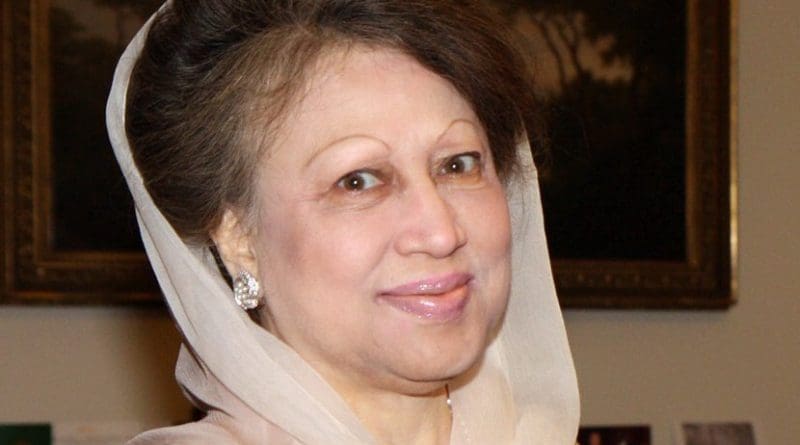Bangladesh: Khaleda To Be Released On Parole? – Analysis
By SAAG
By S. Chandrasekharan
On 6th April, Home Minister of Bangladesh, Asaduzzaman Khan dropped a hint that the Government was willing to consider parole for Khaleda Zia in the event of her applying for parole giving specific reasons. That indicated that there had been some behind the scene discussions between the Awami League and the BNP on Khaleda’s health and the possibility of letting her go abroad for treatment.
Khaleda had been jail since Feb 8, 2018 and could not contest the National elections in end 2018 because of her conviction and sentence for five years in the Zia Orphanage Trust Case. She could not get bail either in all the 34 cases she was involved in.
Khaleda had also been unwell for some time and was since moved to the Sheikh Mujib Medical University Hospital for severe joint pain.
As recently as 20th, Mirza Fakhrul Alamgir alleged that there was a plot to kill his party Chairperson Khaleda in prison by denying her medical care. As before, he threatened a movement to retrieve the country’s “destroyed democracy” but did not go beyond that.
This is a refreshing change from the post 2014 election scenario when the party with the help of JEI cadres brought Dhaka to almost a standstill. Roads were blocked and innocent passengers in the vehicles were attacked. It is estimated that within a week of the elections over 150 people were killed. Many BNP leaders are still going in and out of the courts in the criminal cases filed against them
It is said that key leaders of the BNP have been talking privately to the Government leaders ever since the Home Minister’s statement and media reports indicate that Khaleda will be going to London for treatment. As a quid pro quo it is likely that six members of the BNP who were elected to the parliament but had not taken oath may be taking oath soon after the exit of Khaleda and join the Parliament.
Already two of the members of the opposition front had broken ranks and taken oath to attend the parliament. Gonoforum lawmaker Mokabbir Khan took oath in the first week of this month defying his party’s decision. Elected from Sylhet, he was a presidium member of the Gonoforum. Earlier, Sultan Manas of the Jatiya Oikya Front had also broken ranks and took the oath to attend the Parliament. He was then promptly expelled from the party in having defied the party’s directive.
With this gesture of granting parole and agreement between the two parties for the BNP law makers to take the oath, it is expected that the confrontational politics between the two that has bedeviled the country will get a respite and perhaps pave the way for both parties to come to terms with each other and engage in constructive politics in future. Much would depend upon the Awami League which is assured of another term of five years with an overwhelming majority.
The BNP though routed in the last elections has a substantial support in the country and cannot be written off. Despite denials to the contrary the BNP has still a working relationship with the JEI at all levels. In fact in the last elections over 25 candidates of JEI while masquerading as BNP candidates contested the elections but withdrew at the last minute. There are many competent right thinking leaders among the BNP who should now assert themselves and ensure that the umbilical cord with the JEI is snapped!
There is also some rethinking particularly amongst the younger elements within the JEI to come clean from their past, apologise to the nation for their support to antiliberation forces in 1971 and thus come out from the “underground” mentality the party had developed since liberation. In an earlier paper I had made a reference to this and suggested that the JEI should be encouraged to break from the past totally.
It is the general view that the BNP made a big mistake in boycotting the 2014 elections and in unleashing an unprecedented violence against innocent civilians. The minority community suffered more.
Luckily, this time, the post election scenario was most peaceful and it has helped Bangladesh to chalk up a good economic record.
The ADB in its most recent report of 4th April has said that Bangladesh is on track to log in the fastest economic growth in the Asia Pacific Region in the fiscal year of 2019-2010. The economy is set to grow at 8 percent in the next financial year with robust private consumption, increased public investment, strong export performance and expansion in industries.
Of particular interest is that Bangladesh has surpassed Pakistan on all parameters in poverty reduction, health, family planning, female education, women’s empowerment and in child mortality. Per capita income is placed at 1909 US $ as opposed to Pakistan’s 1700 US$! A creditable record indeed.

